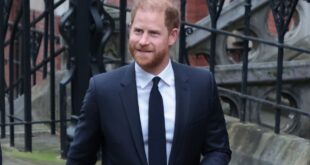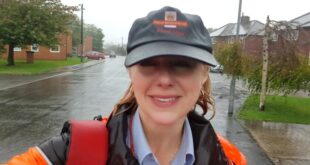He was the princely spare who married a beautiful foreigner without any aristocratic credentials. Eclipsed by his dashing elder brother, Prince William, he chose to pursue a career outside the constraints of royal life.
But when tragedy struck, duty beckoned. And unlike a rather more notorious second sibling of modern times, Prince Richard, later Duke of Gloucester, turned to embrace his destiny without complaint.
Even today, as he turns 80, Queen Elizabeth’s cousin is one of the monarchy’s most hardworking members, undertaking close to 200 public engagements annually.
Moreover, neither he, nor his elegant Danish wife, Birgitte – a lawyer’s daughter who worked as a ‘nine-to-five secretary’ before their marriage – has ever uttered a word in public about their lives at the heart of the Royal Family.
Eclipsed by his dashing elder brother, Prince William (right), the Duke chose to pursue a career outside the constraints of royal life

At the Order Of The Garter Service At Windsor Castle. On either side of Prince Richard, the Duke of Gloucester, is Prince William and his uncle, the now Duke of Edinburgh

The Duke of Gloucester in a photo taken by his daughter, Lady Rose Gilman, at their cottage in Gloucestershire
And yet what a story they could tell – for Prince Richard was arguably the first royal trailblazer of the modern age. A man who, say friends, has lived his life with total independence, ‘absolute authenticity’ – and unfettered loyalty to the Crown.
Though he was standing with the King on the Buckingham Palace balcony after his Coronation, he is someone who can walk down the street unrecognised and will hop on the train to royal engagements without fanfare. At Kensington Palace, he can often be seen wandering around after his dog, poo bag in hand.
What makes this all the more remarkable is that Prince Richard Alexander Walter George was born fifth in line to the throne as one of George V’s nine grandchildren. To put it in perspective, that’s Prince Harry’s position in the order of succession today (although Richard has since slid down to 31st).
Two of his father Prince Henry’s elder brothers became king: Edward VIII (wholater abdicated) and George VI, father of Queen Elizabeth.
His mother, Princess Alice, the late Duchess of Gloucester, was the daughter of the Duke of Buccleuch, Scotland’s largest landowner. The family was so grand they had their own train to take them between homes.
But Eton-educated Richard remains, say friends, the most unaffected man you could meet.
Bernard Hunt, who was a fellow student at Magdalene College, Cambridge, recalls how, while he arrived in 1963 with a chauffeur – who would also deliver tuck boxes from the family’s Northamptonshire home, Barnwell Manor – Prince Richard quickly became ‘just one of the guys’.
Mr Hunt suggests Richard’s father, not always the easiest character, had been very conscious of the constraints in his life.
‘One brother abdicated, which was a profound shock to the entire family, the other became King,’ he explains. ‘So the Duke was happy for Richard, his younger son, to pursue his own dreams.’
After three years studying architecture – during which time he went to a tea party and met the love of his life, Birgitte, who was studying at a language school in Cambridge – Prince Richard stayed on for postgraduate study.
He bought a house in the city for himself and his friends. It was known as ‘Vic Street’ and they put posters of Che Guevara and Chairman Mao on the walls.
‘Richard just said “look come and stay”,’ Mr Hunt recalls. ‘He didn’t accept any rent, just let us all hang out. It was half converted, so we worked on the rest and lived there as a kind of commune.’
Afterwards, the young royal went off travelling the world, sending his friend amusing postcards Mr Hunt still treasures.
When he returned after six months he joined Mr Hunt as a partner in his architectural practice in North London, Hunt Thompson Associates.
The Crown Estate offered him a ‘magnificent’ villa overlooking Regent’s Park. Instead, he insisted on buying his own flat in a ‘not very salubrious part of Camden Town’, which enabled him to walk to work – and to provide privacy for Birgitte to stay over. Tragically, however, the normality was fleeting.
Just a year into his job – and just weeks after he and Birgitte married in the local parish church in Northamptonshire – his elder brother, heir to the dukedom, was killed while racing his plane aged 30.

On his wedding day in 1972 to his Danish wife, Birgitte – a lawyer’s daughter who worked as a ‘nine-to-five secretary’ before their marriage

Prince Richard Alexander Walter George (in his mother’s arms, with his brother, William, left) was born fifth in line to the throne as one of George V’s nine grandchildren

Henry, Duke of Gloucester with his wife, Alice, and sons, William and Richard (right) at Barnwell Manor, in the late 1950s
The bodies of Prince William –dubbed ‘The James Bond Prince’ for his dashing looks and glamorous lifestyle – and his co-pilot were badly burned and could only be identified from dental records.
Mr Hunt, who was staying at Barnwell Manor when the terrible news came, recalls that ‘when William died, everything changed.’ Devastated by the loss of his brother, Richard, then aged 28, had to give up the job he adored and swap his flat for the gilded cage of a Kensington Palace apartment. Friends say they never heard him utter a single word of protest. ‘That’s just not his style.’
Two years later, in 1974, he inherited the family Dukedom after the death of his father, the last surviving child of King George V and Queen Mary. His transformation into full-time working royal was complete.
He pursued his new duties with quiet diligence, and is currently associated with more than 150 charities and organisations.
Some reflect his professional and personal interests, including heritage and architecture, but he has also travelled overseas extensively, particularly on behalf of his late cousin, Queen Elizabeth.
Claire Walker, National Churches Trust chief executive, says of their vice-patron: ‘I do think he is one of the unsung heroes of the Royal Family. He just comes in, is absolutely charming, does an excellent job and doesn’t want any fuss.’
She recalls how a member of staff once arrived for an engagement in a taxi and the driver refused to take a credit card, so the Duke fished in his pocket for a £20 note to pay. A Royal carrying their own cash, heaven forbid!
Dr Nicola Stacey, of the Heritage of London Trust, talks of his ‘passion and knowledge’ and tells how he once shared his egg mayonnaise sandwich with her when he noticed she hadn’t been served any food at an event.
Julie Spence, Lord-Lieutenant of Cambridgeshire, has worked with him for years. She is impressed by his knowledge of his subject matter as well as his ability to give off-the-cuff speeches from a couple of lines of scribbled notes.
On engagements he is partial to an apple juice – and a slice of chocolate cake if he can find one.
According to Mrs Spence, his private secretary Lt Col Alastair Todd has been asked by the Duchess to ensure her husband’s weight stays in check. ‘Chocolate cake is definitely banned but everyone wants to sneak one in because he loves them,’ she says.

At the races at Epsom with the late Queen Mother

The Gloucesters with their children, Alexander Windsor, Earl of Ulster, Lady Davina Lewis and Lady Rose Gilman, in the 1980s

Prince William, King Charles, Prince Richard, Duke of Gloucester (in uniform, third from left), Princess Anne, Princess Royal and Prince Harry walk behind the coffin during the procession for the Lying-in State of Queen Elizabeth II in 2022
The Duchess, with whom he celebrated 50 years of marriage in 2022, is described by friends as ‘the other half of his soul’. They still sweetly turn up to royal engagements hand-in-hand.
The couple have three children: Alexander Windsor, Earl of Ulster, Lady Davina Lewis and Lady Rose Gilman, as well as six grandchildren, none of whom pursue royal duties or any kind of public lives.
‘They could all have chosen to live more in the spotlight but don’t, which I think says a lot,’ another family friend adds.
Prince Richard’s reputation for normality even stretches to his finances: when he and Birgitte became engaged she sported an inexpensive ring he had bought because she loved it so much.
‘I’m not buying another,’ he said firmly. This year he sold his family’s beloved Northamptonshire estate, Barnwell Manor for £4.75 million, having rented it out since 1995 to pay family death duties.
His mother, Princess Alice, even moved in with her son and his wife at Kensington Palace until she died in 2004, just short of her 103rd birthday, to save cash.
Their former 21-room home, Apartment 1, made them neighbours of a young William and Catherine. But in 2019 they quietly moved into a more modest apartment, The Old Stables, supposedly to make way for Harry and Meghan – who, of course, never took up residence after their spectacular family fall-out.
The Gloucesters were adored by the late Queen Elizabeth, and the King has been so grateful for the Duke’s diligence and constancy that he awarded him the patronage of the Royal Institute of British Architects. He also made the Duchess of Gloucester a member of the Order of the Garter, like her husband.
‘His Majesty has deep affection and particular gratitude at the way both he and Duchess have stepped up since his cancer diagnosis, particularly when he was unable to do as many public duties as he would have liked,’ a source tells me.
‘They are hard workers, and that is greatly appreciated. They are low key, low maintenance and endearingly loyal.’
The Duke’s friend Mr Hunt believes the key to his success has always been his lack of ego.
‘Some of the things he has done over the years have been revolutionary in their own way,‘ he argues. ‘He studied, he went into a profession in the days you were only ever allowed to join the military or the Foreign Office, bought his own house and married a commoner.
‘It was all quite unthinkable and really rather radical then. And yet no-one blinked an eye as he didn’t make a song and dance about it.
‘He’s not a natural trailblazer but I would argue he’s been an incredibly influential figure in the evolution of the modern monarchy. It’s truly extraordinary when you reflect on it.’
It is a lesson that certainly has resonance today. And one that, as a well-placed source tells me archly, shows how it is possible to make the most of being a spare.
Source link

